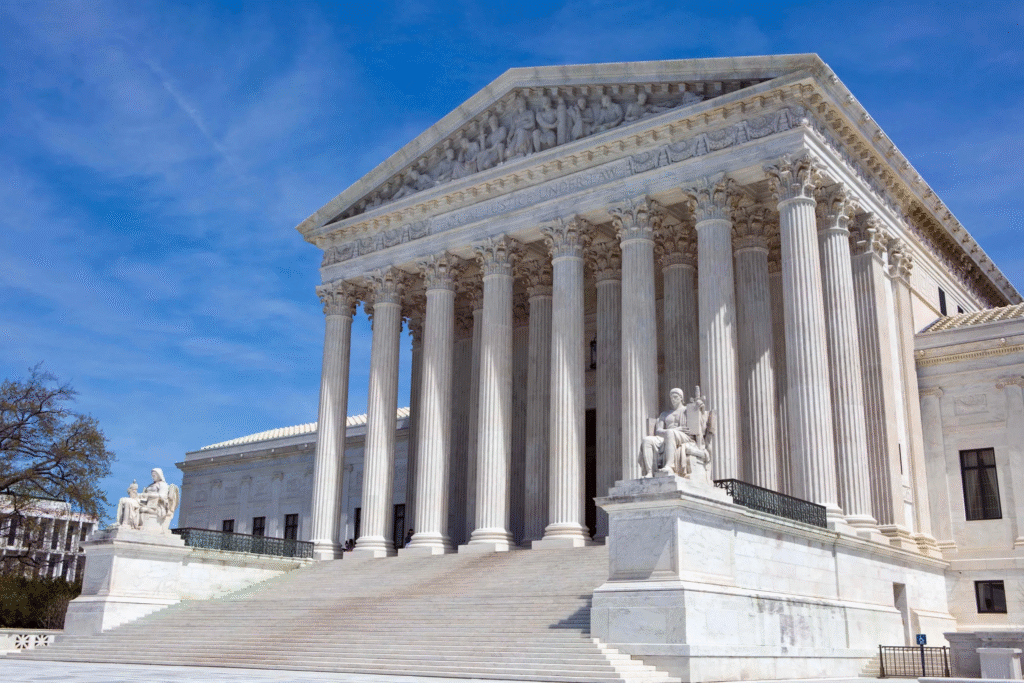
The Supreme Court of the United States (SCOTUS) is the highest court in the federal judiciary of the United States. It has ultimate appellate jurisdiction over all U.S. federal court cases, and over state court cases that turn on questions of U.S. constitutional or federal law. It also has original jurisdiction over a narrow range of cases, specifically “all Cases affecting Ambassadors, other public Ministers and Consuls, and those in which a State shall be Party.”[2] In 1803, the Court asserted itself the power of judicial review, the ability to invalidate a statute for violating a provision of the Constitution via the landmark case Marbury v. Madison. It is also able to strike down presidential directives for violating either the Constitution or statutory law.In a landmark term ending July 2024, the US Supreme Court issued seismic rulings impacting presidential immunity, regulatory power, and social rights – decisions with global ripple effects. With India’s own legal reforms underway, these precedents could influence everything from digital regulations to executive accountability worldwide. The Court’s conservative shift now positions it as America’s most powerful policy-shaper.
Trump Immunity: Presidential Shield Expanded
The 6-3 ruling (July 1):
- Presidents enjoy absolute immunity for “core constitutional acts”
- Presumptive immunity for other official acts
- No immunity for unofficial/personal conduct
- Impact: Delays Trump’s January 6 trial; sets precedent for future leaders
Regulatory “Chevron Doctrine” Overturned
In Loper Bright v. Raimondo (June 28):
- 6-3 vote kills 40-year-old legal standard
- Courts no longer defer to agency expertise (EPA, FDA, etc.)
- India Relevance: Could embolden challenges to SEBI/RBI regulations
Key Social Rights Rulings
| Case | Decision | Impact |
|---|---|---|
| FDA v. Alliance | 9-0 against challenge | Abortion pill access preserved |
| Grants Pass v. Johnson | 6-3 | Allows criminalizing homelessness |
| Moyle v. US | 5-4 | Emergency abortions protected in Idaho |
Indian-American Justices Split
- Justice Jackson (Liberal): Dissented fiercely in immunity case (“King George” warning)
- Justice Rao (Conservative): Joined majority on Chevron, immunity rulings
Implications for India-US Relations
- H-1B Visas: Chevron reversal may complicate DHS rule changes
- Tech Regulation: Weakened FTC could slow US Big Tech crackdown (affecting Indian startups)
- Climate Policy: EPA power reduction hinders Paris commitments
Future Battlegrounds
Pending petitions include:
- Social Media Laws: Challenges to Texas/Florida content-moderation laws
- Gun Rights: Assault weapons ban challenges
- Affirmative Action: New cases targeting corporate DEI programs
Summary: The US Supreme Court’s historic term expanded presidential power while curtailing federal agencies’ authority – creating legal tremors reaching India’s regulatory landscape. As the Court maintains its conservative supermajority, its rulings will increasingly shape global business norms, digital governance, and executive accountability standards in democratic nations.
US Supreme Court grants Trump immunity, ends Chevron doctrine. Analysis of rulings’ impact on India’s regulations, H-1B visas & global governance.
